What's Happening?
A recent analysis highlights the slow growth of the U.S. electric vehicle market compared to other countries. The data, shared by Mike Shurtleff and published by Our World In Data, shows that countries like Norway and China have made significant strides in EV adoption, with China reaching a 50% market share. The UK and Europe have also seen strong growth, although the EU experienced a slight stall in 2024. In contrast, the U.S. market remains small, with sluggish sales growth, indicating that the country is falling behind in the global transition to electric vehicles.
Why It's Important?
The slow pace of EV adoption in the U.S. has broader implications for the country's position in the global technology landscape. As other nations advance rapidly in electric vehicle integration, the U.S. risks losing its competitive edge in automotive innovation and environmental sustainability. This lag could affect the domestic auto industry, potentially leading to missed opportunities in emerging markets and technological advancements. The disparity in EV adoption rates underscores the need for policy changes and increased investment in infrastructure to support electric vehicles.
Beyond the Headlines
The U.S.'s slow EV adoption may reflect deeper systemic issues, such as insufficient infrastructure, lack of consumer incentives, and regulatory hurdles. Addressing these challenges requires coordinated efforts from government, industry, and civil society to promote sustainable transportation solutions. The transition to electric vehicles is not only a technological shift but also a cultural and economic one, necessitating changes in consumer behavior and industry practices. Long-term strategies could include enhancing public charging networks, offering more attractive incentives, and fostering innovation in battery technology.











